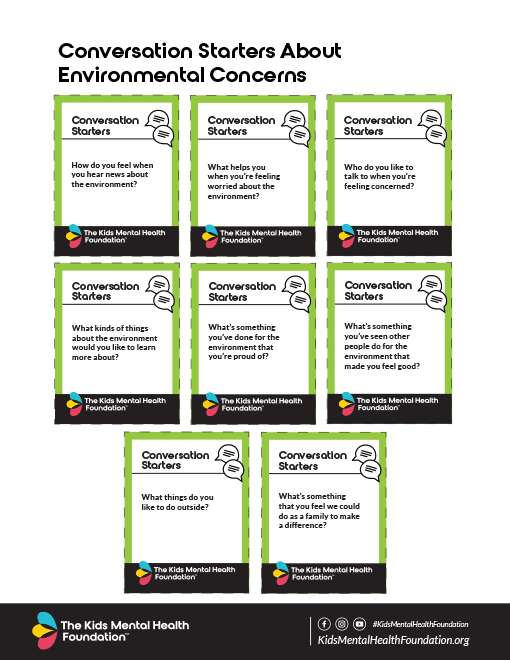How to Help a Child Who Experiences Eco-Anxiety
Article Summary
- Children are increasingly worried about the environment, including climate change, microplastics, extinction of species and more.
- Eco-anxiety is stress and negative feelings associated with environmental changes. It's not a clinical diagnosis, but it can be overwhelming.
- There are strategies to help children who are having or expressing environmental worries.
When you were growing up, you might have been afraid of nuclear war, Y2K or being kidnapped. Kids today may worry about an increase in hurricanes or intense wildfires and many believe that climate change is the biggest issue facing society. According to a survey of over 15,000 young people aged 16 to 25 across the U.S., 85% said they felt at least moderately worried about climate change and its impact on people, with 57.9% saying they were very or extremely worried.
There’s a term that describes this kind of ongoing stress, concern and negative feelings associated with environmental changes: Eco-anxiety. This isn’t a clinical diagnosis, but some people who struggle with eco-anxiety also have anxiety or depression.
Eco-anxiety can be overwhelming for children, teens and. even adults. Some are frightened by worst-case scenarios about the future. Others feel frustrated or angry that the actions (or inaction) of governments and corporations contributed to the problems of today and into the future. Still, others feel powerless to help the environment.
Younger people often feel more personally affected by climate change than older generations since they anticipate dealing with the effects longer.
If your child experiences eco-anxiety:
- Support your child’s feelings. Validate your child’s emotions instead of saying there’s nothing to worry about. False reassurances about real environmental problems aren’t helpful and could lead your child to feel that you don’t understand their concerns and don’t perceive the world the same way they do.
- Squash their guilty thoughts. Some kids feel personally responsible for harming the environment. Let your child know about the limits of individual responsibility: Given the system we live in, none of us can avoid impacting the environment, and no one person is to blame for not solving climate change.
- Support positive change. Help your child find age-appropriate ways to help the environment. Younger kids can help to recycle or to reduce energy use by turning lights off around the house. Teens can write to elected officials supporting eco-friendly legislation or ask local businesses to adopt greener practices. Research suggests that actions like these change a child’s self-perception from passive victim to active agent.
- Join eco-friendly groups. Help your child find or create a group that matches their values. Connecting with like-minded peers may boost their mental health, and they’ll make a bigger impact with a group than they could have made individually, which should be meaningful for your child.
- Make changes... within reason. Honor some of your child’s environmentally friendly wishes, like eliminating plastic water bottle usage. But don’t let one child with eco-anxiety make all the decisions for the household. Instead, let every family member suggest changes they’re willing to make.
- Schedule more outdoor time. A child who worries about the environment may benefit from visiting green spaces to witness the beauty of nature. Spending time in natural spaces has been shown to reduce stress levels.
- Help your child maintain hope. Encourage your child to be hopeful about a better tomorrow and alert them to positive environmental news. Hope may help steer your child into action, so they can be a part of the solution.
When to Worry
If your child’s concerns about climate change are affecting their appetite, sleep habits, academic performance and/or social interactions, seek therapy. A climate-aware therapist in your area should be sensitive to your child’s feelings.
You can help children in your life with their worries about the environment, whether that’s climate change, natural disasters, animal extinctions or other related topics. By having conversations, listening to their thoughts and suggestions and helping them connect with others who are working to make change, you can encourage them to feel more empowered.
References
Haase E. Hudson K. eds. Climate Change and Youth Mental Health: Multidisciplinary Perspectives. Cambridge University Press; 2024.
Lewandowski RE. Clayton SD. Olbrich L. Sakshaug JW. Wray B. Schwartz SE. Van Susteren L. (2024). Climate emotions, thoughts, and plans among US adolescents and young adults: a cross-sectional descriptive survey and analysis by political party identification and self-reported exposure to severe weather events. The Lancet Planetary Health, 8(11), e879-e893. 10.1016/S2542-5196(24)00229-8
Baker C. Clayton S. Bragg E. (2020). Educating for resilience: parent and teacher perceptions of children’s emotional needs in response to climate change. Environmental Education Research, 27(5), 687–705. https://doi.org/10.1080/13504622.2020.1828288
Baudon P. Jachens L. (2021). A scoping review of interventions for the treatment of eco-anxiety. International journal of environmental research and public health, 18(18), 9636. https://doi.org/10.3390/ijerph18189636
Léger-Goodes T. Malboeuf-Hurtubise C. Mastine T. Généreux M. Paradis PO. Camden C. (2022). Eco-anxiety in children: A scoping review of the mental health impacts of the awareness of climate change. Frontiers in Psychology, 13, 872544. https://doi.org/10.3389/fpsyg.2022.872544
 Copy Link
Copy Link




